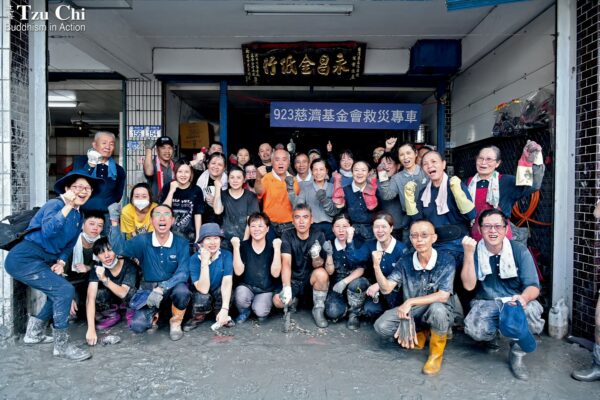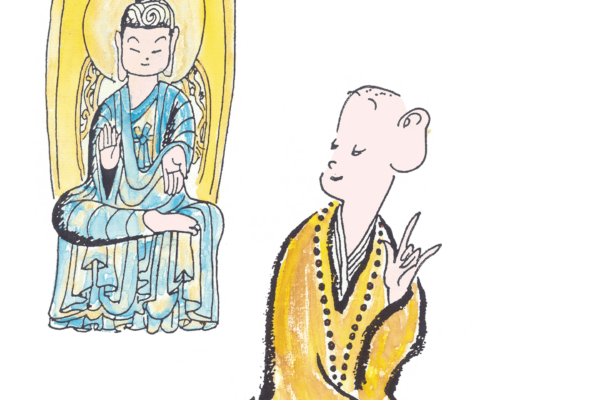By Ji Shu-zhen
Translated by Wu Hsiao-ting
He was a conscientious postman who worked hard to ensure that every piece of mail reached its intended destination. He treats his volunteer work with just as much commitment and dedication.
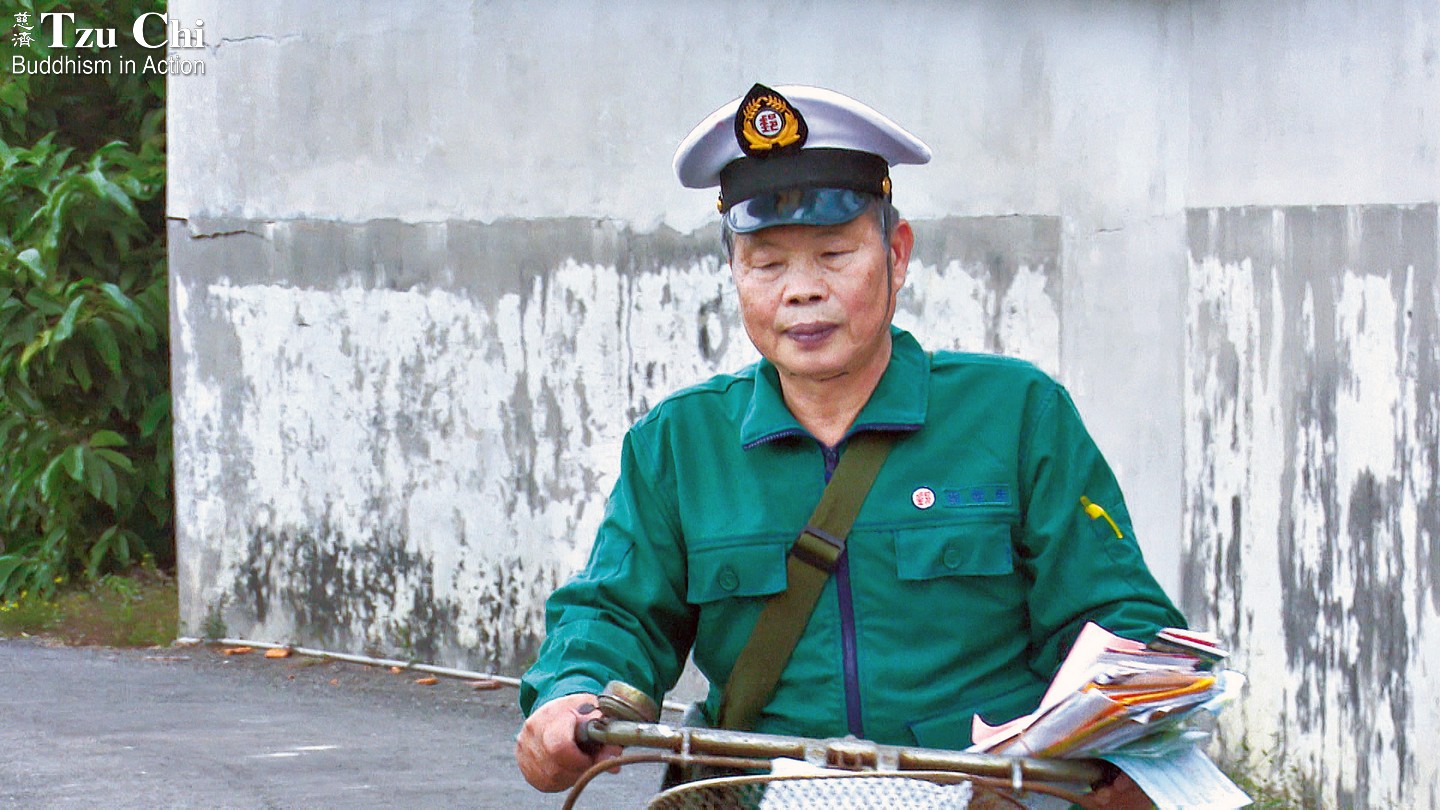
Cai Zong-qin was a dedicated postal worker, and is just as dedicated to his volunteer work for Tzu Chi.
Yin Cheng-cang
“Registered mail!” Cai Zong-qin (蔡宗欽) hollered out as he arrived at a house, delivery in hand. In response, two large, strong dogs barked fiercely back at him. They bared their teeth and looked ready to charge him at any moment.
“Fortunately, the owner of the house was home that time,” Cai recalled. “Otherwise I might have ended up at a hospital.”
The former postman continued: “To be chased by or even bitten by dogs is something every postman goes through from time to time. The only difference is whether you are chased by a large or a small dog.”
The bicycle Cai rode to deliver mail was green, with a basket in front. The saddlebags at the rear of the bike were typically bursting at the seams with mail. He biked close to 30 kilometers (20 miles) a day, weaving through streets and lanes, rain or shine. As he knew well, a postman has no right to complain about the weather. He attended to his rounds no matter if the weather was hot and sweltering, or with violent winds blowing, or was raining cats and dogs. And it was always him, not the mail he was delivering, that got wet on a rainy day, because he did everything he could to protect the mail from water damage.
Cai said that when people put something in the mail, they expect it to be delivered. “It’s our duty to ensure that every piece of mail is delivered to its intended destination,” he said with a serious expression. A sense of responsibility pushed him to do his best at his job. But he holds the same attitude for everything else in life, including his volunteer work for Tzu Chi.
No problem. I’ll do it
“Brother Zong-qin, we are short on hospital volunteers this month,” said a fellow volunteer to Cao. “Brother Zong-qin, I can’t go cut the grass tomorrow!” said another volunteer. “No problem. I’ll go.” Cai is quick to fill in for others in such types of situations, and is very understanding whenever someone who has volunteered to do something is unable to do so. “I know our volunteers are committed to their work for Tzu Chi,” he said. “They don’t easily let go of any chance to serve. When they have to pull out of something, there must be a good reason for it. So, I’m more than happy to fill in when there is a vacancy.”
Cai, known for his modesty, regards every chance to volunteer as a privilege, and he goes all out to carry out his assignments. He has exhibited this quality since he was young.
Cai was born in 1954 in Dacheng Township, located in the most southwestern corner of Changhua County, on the west-central coast of Taiwan. Strong winds blew all year round in that region, unfavorable conditions for farming, but that’s how Cai’s family made a living. He is the oldest child in his family. When he was still very young, he had to take his two younger brothers and a younger sister to the fields after school every day to cut fodder, harvest crops, or do other chores. During busy times of the farming year, he also had to feed the cattle, move rice seedlings, and plant them. Farming was hard work, but he never complained. He felt he was just doing what he should do.
Most children in his impoverished hometown stopped going to school after graduating from junior high school. They either stayed home to help out on their family farm or left town to work to help support their family. Cai’s grandfather, however, decided to let him continue going to school. Cai was therefore one of a small number of children from among the local farming families who made it to high school. But he still worked during his free time in high school. Via a relative’s introduction, he was hired on as a part-time cleaner at the local post office.
While he was working there, he began to realize it might be a good place to work full-time after he graduated from high school, either as a postman or a window clerk. It would offer a steady income, and it certainly beat toiling away on a farm. After he finished high school, he approached the postmaster to inquire about the possibility of his working there. The postmaster was a kind man with a head of white hair and a constant smile on his face. After he listened to Cai’s inquiry, he said apologetically that there was no vacancy. Cai felt like a deflated balloon, his hopes dashed.
The postmaster continued, “The need for postal employees in a rural area is usually small, and there is a slower turnover rate. Why don’t you try to get hired on in Taipei?” The postmaster’s suggestion reignited hope in him, and he soon started sending application letters to various post offices in Taipei.
Banqiao, in Taipei County (now New Taipei City), had at that time just been upgraded from a town to a county-level city. Tall buildings were popping up on the streets one after another, like mushrooms after a rain. To meet the rising demand for mail delivery, the city’s postal system was hiring a large number of people. After passing an examination, Cai succeeded in landing a job as a postman at Banqiao Post Office in 1974.
In 1990, he applied to be transferred to Changhua Post Office so he could work closer to his home. His application was granted. He was promoted to the position of mail sorter at the same time. Changhua is located at the intersection of the Taiwan Railways Administration’s Mountain Line and Sea Line. Mail to be delivered to different places in Taiwan converged there before being sorted and sent to post offices across the island for delivery. Cai worked the graveyard shift. Though his new position as a mail sorter saved him from having to work outside in all kinds of weather, he had to readjust to a new schedule that required him to work through the night. He took it in stride though. He reported to work every night at nine and clocked out past six in the morning. He lived a life like this for 27 years.
Cai’s wife, Hong Shu-qing (洪淑卿), became a Tzu Chi donating member in 1983. She also began participating in volunteer activities. Gradually, she got her husband involved as well. Cai said, “I tagged along when my wife went volunteering. I literally followed in her footsteps.”
Some time later, Cai began collecting recyclables by truck for a Tzu Chi recycling station. Often, when he had just arrived home after a night’s work at the post office, his wife would ask him, “Do you want to go collect recyclables now, or catch up on your sleep first?” “Let’s go now,” Cai would reply. Then off they went, stopping at the collection points on their round, picking up the recycling, and transporting it to the recycling station.
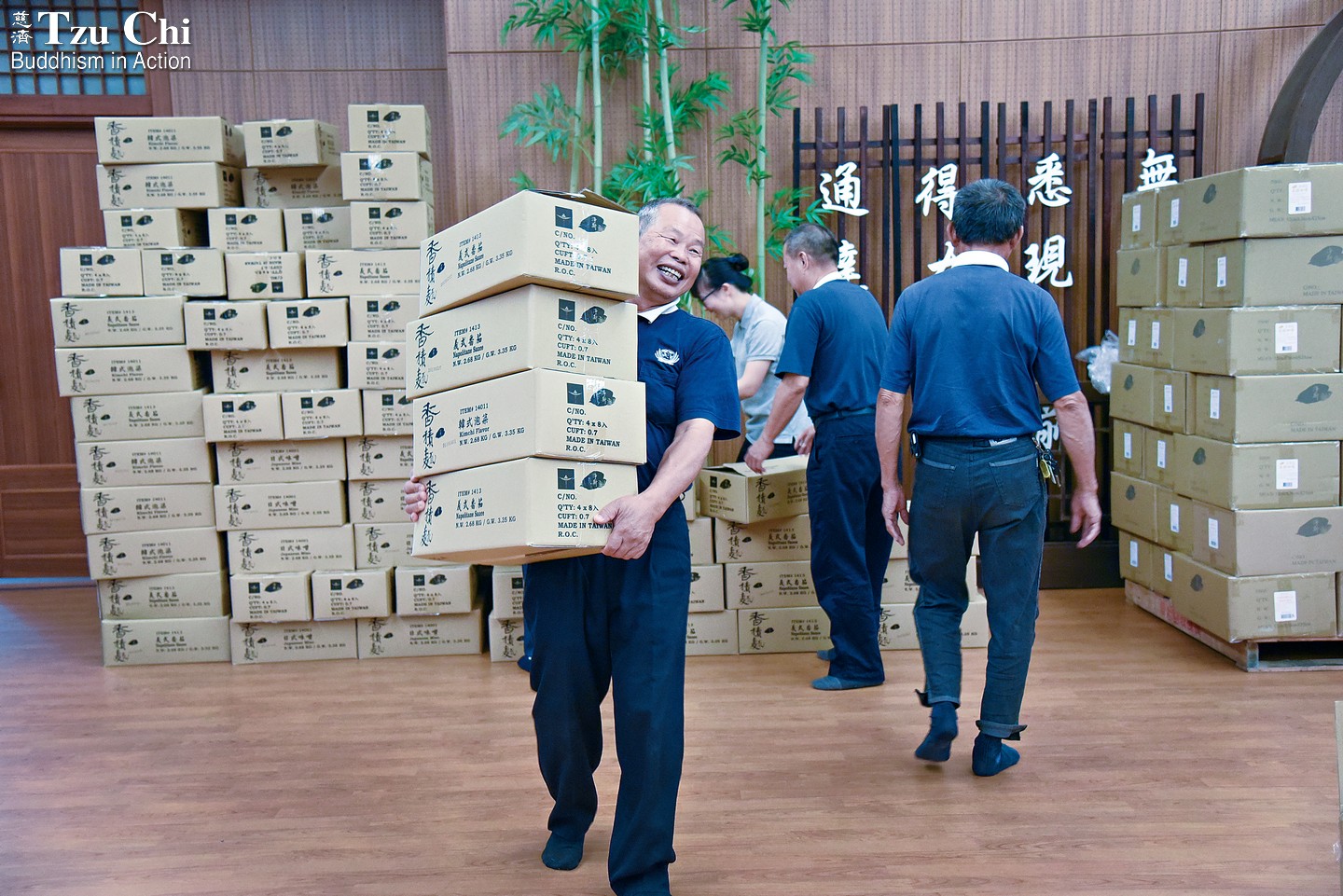
Cai never turns down a task in Tzu Chi and is happy to fill in for others. This picture shows him helping with the foundation’s relief work for flood victims in Chiayi, southern Taiwan, in 2018.
Wu Bi-feng
Helping hands, dedicated heart
When the disastrous 9/21 earthquake hit central Taiwan in 1999, Cai happened to be at a mountain lodge taking part in an employee training course for postal workers. The day after the tremor, they began to venture down the mountain. They saw bumps or cracks created by the tremor everywhere on the surface of the road on their way down.
As he was making his way down, Cai heard someone calling for help from a collapsed temple at the side of the road. “Help! Is anyone around?” He quickly stopped his car and dashed toward the temple. “Quick, take this!” someone said to him. Before he even had time to respond, someone handed a child to him. The child had been trapped under a pillar earlier. Cai took the child in his arms and walked to a safer place.
Though it felt nice to help save people, Cai’s heart grew heavier and heavier the more he continued down the mountain. More broken road and collapsed or tilted buildings met his eyes. “The more I saw, the more frightened I became,” he recalled. “It was the first time in my life I had sensed how insignificant and vulnerable human beings were in the face of nature’s powerful forces.”
Early the next morning, he hurried to a large collapsed building in Yuanlin, Changhua, to prepare hot food for rescue workers and waiting family members. He also chanted the Buddha’s name with other volunteers to pray for peace for the departed. Despite recurrent aftershocks, first responders pressed on with their rescue efforts. He wanted to do more to help. Feeling deeply for the deceased and their family members, he continued chanting the Buddha’s name in devout sincerity.
For nearly a month afterwards, he traveled early every morning to Puli, Nantou County, where the epicenter was, to build temporary housing for people who had lost their homes to the earthquake. He moved building materials, laid interlocking paving bricks, and did whatever else he could. He worked hard with the others who had pitched in to help, hoping to finish the temporary housing as soon as possible so that quake survivors could have a roof over their heads.
After participating in Tzu Chi’s relief work for victims of the 9/21 earthquake, Cai identified even more deeply with the foundation’s mission to help the needy. He started training the year after the tremor to become a certified volunteer.
Cai has always been known for his dedication to his volunteer work. One time, he went to Hualien Tzu Chi Hospital to volunteer for a week. His duties consisted of delivering case histories to the various consulting rooms where doctors saw patients, and retrieving the case histories when medical workers were done with them. His work required so much walking that by the third day, his big toe began swelling and hurting badly. His old ailment—gout—had flared up.
“It hurt so badly,” he recollected. “Even a whiff of wind would make the pain worse. I could hardly sleep that night.” When he woke up the next morning, he sat on the edge of his bed, gently stroking his swollen foot while putting on his socks. Never one to quit easily, he decided to bite the bullet and finish his week-long volunteer session at the hospital. Standing up with the help of his hands, he walked out of his room. Over the next four days, he continued doing what he had been doing on the first three days: delivering case histories and taking them back. He volunteered at the hospital for a full week—just as he had committed himself to.
Cai retired from his postal work in 2017 and became a full-time volunteer. He does all kinds of work in Tzu Chi: cleaning the Changhua branch office, cooking for Tzu Chi events, doing dishes, and more. “I’m lucky to be able to volunteer after I retired,” he said with a smile. “Otherwise I might be sitting in a massage chair now, dozing off.”
Volunteering for Tzu Chi takes him out of his home, keeping him socially active and healthier. His four daughters and six grandchildren all fully support his volunteer work. After a long career helping get mail to people, he now helps Tzu Chi deliver its mission to all.
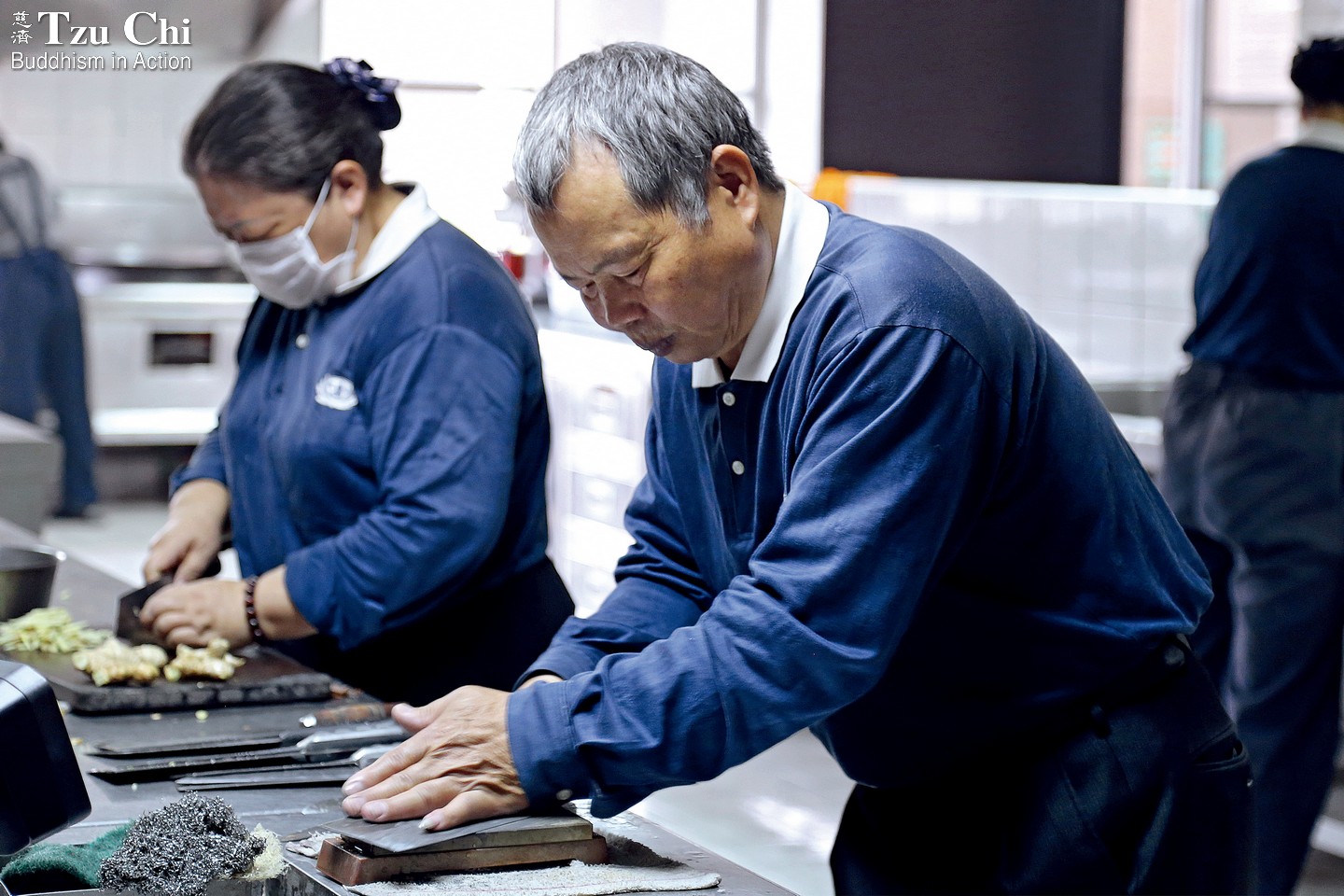
Cai sharpens a kitchen knife while serving as a culinary volunteer. He tries to make himself useful in whatever way he can in Tzu Chi.
Yan Xiu-ying

